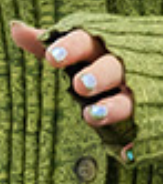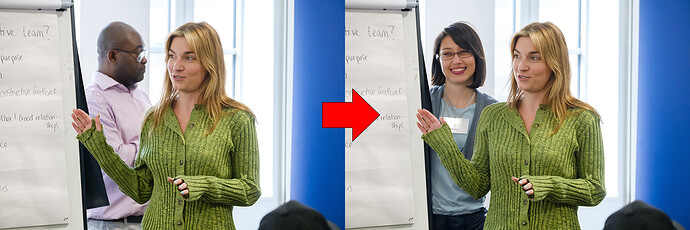I’ve been editing a client shoot today, and I asked Adobe Photoshop’s Generative Fill to “remove the man in the background”… and it added in Maureen from Accounts instead… ![]()
![]()
Very helpful!
(And the woman in green has only three fingers on her left hand.)
Re-did the windows as well.
Her pinky is tucked in the bottom of her sleeve in both pictures.

She’s wearing a weird knitted top that covers her hands and has a thumb loop - odd as the outside temperature was in the high 20s C.
The AI modification was limited to the area where the man was standing.
It is a good job Maureen wasn’t busy with Yeaf End accounting and had time to do some modelling !!
Joseph Stalin would have found this very helpful and saved him a small fortune in photo retouching.
We’ve basically replaced Winston Smith with a computer program.
I did have a go with the AI generative fill in photoshop. It seems frustratingly inconsistent, sometimes seamlessly altering, and others just slapping in something weird.
Do you find it reliable?
I generally give it very simple tasks, like removing a reflection of my flash softbox from a window, or opening the eyes of someone who has blinked.
For those tasks it’s very good - normally one of the three alternate options it provides will work.
To be fair to it, the other choices in this case did not include Maureen from Accounts - I don;t know why it thought she should be in the photo. In one of the other generated results it decided that having a wall clock hanging in the window would be nice. ![]()
In the 1920s the US father of semiotics, Charles Sanders Peirce argued that a photograph was an indice of the actuality of an event - ie. what it depicted had actually taken place. Of course, in fact he was way behind the curve (why do flies fall in my wine…) as faking photos seems to have been a Victorian pastime.
Nevertheless, analogue photography continued to be regarded as relatively truthful for many more decades until it started to be questioned as to what lay beyond the frame or had been cropped out. This is probably the most famous example:-
I’ve been taking photographs for over fifty years, some as records of events, or the appearance of art works, some as information to be manipulated in other art media (screen-printing etching lithography) and from the late Eighties, some as info to be digitally manipulated. And most recently some to place on SF Randos’ photos thread.
But although I know a great deal about the technical and theoretical aspects of photographic media, - I’ve been using Photoshop since 1992 and giving international papers on visual culture for as long, yet I don’t feel comfortable with AI manipulation of supposed ‘documentation’. One can argue that it’s just a point on a spectrum of manipulation of ‘inauthenticity’, but for me in many contexts it’s already a point too far that threatens to at least to soon make the commercial photographer redundant.
First I would mention is that this post is in the comedy section not philosophy or history of art. ![]()
![]()
But to respond to your point - I also feel uncomfortable with much AI fakery - when it is done with an intention to deceive (e.g. porn “deepfakes” of celebrities, or falsification of news images).
AI as a speedier and more efficient alternative to manual retouching I have less of a problem with - it’s usually just 'tidying up" an image and doesn’t alter the essential character of what’s depicted.
As you mentioned, retouching (and faking) of photos was done in the analog film days from pretty much the beginning of photography so AI is just a technical development of that.
I don’t see it replacing commercial photographers though, at least not in many fields.
There are some genres where computer-generated imagery is the norm - I rarely get asked to photograph watches any more, because the manufacturers and retailers prefer to use CGI images generated from the manufacturing CAD files - for their accuracy and the ease with which a “perfect” image can be created. Plus all those animated exploded view videos that they like to use. Car photography and video is going the same way.
However there are lots of genres which involve the representation of actual people and events, where authenticity is more important than “perfection”.
I shoot a lot of corporate events (conferences, seminars, sales events, team-building etc) and a natural documentary approach is what’s wanted, not a glamourised version.
Business portraits / headshots is another area where using an AI-tweaked image could be very counterproductive, especially if it goes into “uncanny valley” territory and no longer looks like the person.
For creating fantasy images yes AI will put a few conceptual artists out of work, but that’s a niche anyway.
Stock libraries and news photo agencies are very strict about AI-generated or modified images being clearly designated as such - they understand that very often authenticity is paramount over prettiness.
So it’s not all doom and gloom.
I am also being philosophical about it because I shall be retired in a few years and it will be someone else’s problem. ![]()
Thanks for your generously detailed reply just a very tiny quibble -‘conceptual artists’ were something else entirely - though I can see the basis for your use of the term and it’s an interesting association with a traditional (ie late Sixties) art making strategy. If I was still in the game , ac omparative study of the two would make for a good conference paper.
I was thinking of people like Ralph McQuarrie (Star Wars. Close Encounters) or Alan Lee and John Howe (Lord of the Rings) who created visualisations on which were based designs for the sets and costumes for the movies.
In art history, conceptual artists were people who, mainly in the Sixties, simply exhibited instructions on how the spectator could ‘complete’ the artwork rather than the artist realising it themselves. Hence the interesting parallels with AI, albeit with the spectator’s ‘direct’ participation being replaced by an algorithm and the viewer reverts to being a … spectator.
Actually from an art historical/philosophical perspective that’s all very interesting and might even get me to stir myself and write a comparison of the conceptual art and AI. There my even be a book in there.
Tho’ I’d really like to focus on building my succulents’ rockery …
@DrMarkH - conceptual artists = posh painters
Me - conceptual artists = people who designed spaceships and Uruk-Hai.
![]()
posh socialist ‘artist’s’ (never ‘painters’- that’s a very different game)
